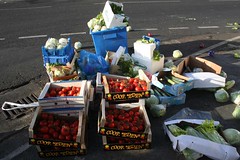Stuff Educated Black People Like
Stuff Black People Loveand of course the one that started it all: Stuff White People Like
Or The One before the Last One
Stuff Educated Black People Like
Stuff Black People Love Case law of Supreme Court of India is online here: http://www.supremecourtcaselaw There seems to be a significant difference in tone between case law here and in India. While the tone here is more of reasoning with the reader (with some intense persuasive language), the Indian case law sounds more binary in its judgment (instead of painting the spectrum of possibilities). Well, I draw these conclusions from one single abstract I just read (a dispute of inheritance of pooja rights; funny!, esp. when the supreme court has pretty far-reaching disputes to settle). Got to read more to make a generalization. :D |
Nikki Giovanni's Convocation address:
We are Virginia Tech.
We do not understand this tragedy. We know we did nothing to deserve it, but neither does a child in Africa dying of AIDS, neither do the invisible children walking the night away to avoid being captured by the rogue army, neither does the baby elephant watching his community being devastated for ivory, neither does the Mexican child looking for fresh water, neither does the Appalachian infant killed in the middle of the night in his crib in the home his father built with his own hands being run over by a boulder because the land was destabilized. No one deserves a tragedy.
We are Virginia Tech.
There was a really popular patriotic song by Raj Kapoor which goes something like this:
Mera Joota hai Japani
Yeh Patloon Inglistani
Sar pe lal topi rusi
Phir bhi dil hai hindustani
(My shoes are Japanese
The pants are from England
The red hat on my head is Russian
But even then, my heart is Indian)
In an ironic twist of India's fate, shoes and trousers now seem to be made in India and the heart...not so much as the younger generations try to break free from the 'meaningless' shackles of the traditional Indian society !!
 BTFM dumped food 1
BTFM dumped food 1According to an estimate shown on BBC's One Planet, a third of all food in the developed world gets dumped. A lot of food goes waste in the developing world as well. But the reasons for wastage are vastly different. In the developing world, a lot of the wastage is because of inefficiencies in supply chain, inadequate refrigeration facilities etc, where as in the developed world, a large chunk of the wastage is at the household level. For instance, in UK alone, out of US$ 38 billion worth of annual food wastage, the retail-store sell-by expiry contribution was a mere $3.54 billion !! They clearly got their act together.
As you might have guessed, information can play an enormous role in minimizing waste in both worlds. A little e-chart on the refrigerator that keeps a tab on expiring foods can be an approach. Another approach could be letting people know the amount of energy and water spent in growing all that food. For example, fruits take water 100+ times their weight. A lot of developed countries import food (as shown in this map) which means wastage of water at places where its usually scarce.
One key insight from both IS210 and IS243 has been: "The key to supply chain optimization isn't moving things faster according to plans, it is moving things smarter according to actual demand" (which implies its more about managing information than actual physical goods). Corporates in developed world have realized and enormously benefited from this for a long time. Besides not seeing any benefit from this realization, developing world poses another significant problem. Its really hard to see an end-to-end system where there are a million different vendors and farmers both of whom have little holdings and revenues. It's a challenging problem and pay-offs can be as large as significant elimination of global poverty and hunger.